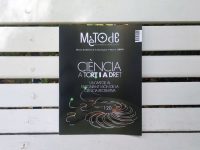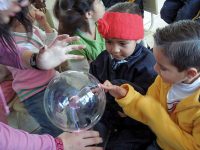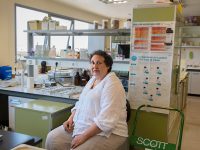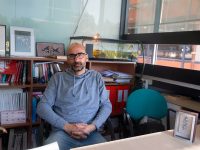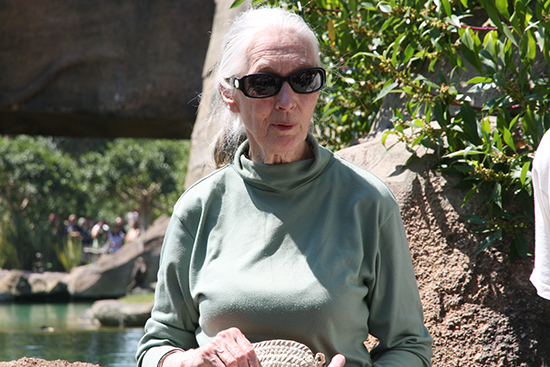
 © José Vicente Bernabeu |
«When I came back from Gombe I explained to the academia in Cambridge that chimpanzees use tools, like us, and that they are capable of feeling emotions; they told me that it was impossible, practically they took me for a lunatic» |
|
|
The primatologist and ethologist Jane Goodall arrived in Valencia on the 10th of May in order to visit Bioparc, where she knew first hand the situation of the animals living there and the activity of the workers of the Valencian zoo in the fields of research, popularisation and consciousness raising of ecology. Together with the secretary of the Bioparc Foundation, Gonzalo Fernández Hoyo, and the executive director of the Spanish Jane Goodall Institute, Federico Bogdanowicz, doctor Jane Goodall toured the facilities, which she praised during the press conference. «I have been to many zoos in the world and I have to say that I never had the opportunity to see elephants as I have seen them here— playing with water, parents and children together. It was very exciting», pointed out the primatologist, who came to present her campaign «Reasons for Hope», in which the Bioparc Foundation works actively. The itinerary followed by Goodall was mainly focused on the area in which chimpanzees live together, a community headed by the male, Napoleon, and which in 2009 brought Kimbo to the world, the first chimpanzee to be born at Bioparc. Nowadays we know that chimpanzees, which Jane Goodall started to study in 1960 in Gombe (Tanzania), share with humans 99% of the DNA, but, when the British researcher went there more than 50 years ago, we still didn’t have these data. «When I came back from Gombe I explained to the academia in Cambridge that chimpanzees use tools, like us, and that they are capable of feeling emotions, like sadness or happiness; they told me that it was impossible, practically they took me for a lunatic», said Goodall ironically. |
||
 © José Vicente Bernabeu |
«As there are good and bad human mothers, in the same way, chimpanzees do not treat all their children equally and give more opportunities to some than to others» |
|
|
A lot of time has gone by ever since and, today, the great amount of similarities there are between these apes and Homo sapiens have been proved. The ethologist stated that thanks to the study of chimpanzees, humans are increasingly aware of the «diffuse line» that separates us from the rest of animals and of the fact that «we belong to the animal kingdom». «Chimpanzees are so similar to us that they can be fantastic on the one hand and terrible on the other hand. As there are good and bad human mothers, in the same way, chimpanzees do not treat all their children equally and give more opportunities to some than to others.» explained Goodall. Maybe it is because of this that the primatologist would rather learn from «elephants and whales» than from chimpanzees. In any case, the relationship there is between the members of the community, and the familiar bond established, were what made her think about the possibility of this species being a kind of hybrid, with emotions. «Until the age of five or six, the baby chimpanzee can live on its mother’s back, sleep with her and breastfeed. Afterwards, from the age of eight or nine, it will be independent, but the bond will be there for their whole lives, I have seen many that come back often to stay with their mothers and siblings, just like we do». REASONS FOR HOPE During her intervention, doctor Goodall emphasised the need for the young to take over and get directly involved in the protection of the planet. This is the goal of the project «Roots and Shoots», in which young people from more than 130 countries take part. Organised in groups, they meet periodically in order to debate about the problems the have in their environment or away from home and plan projects to find solutions, with initiatives linked to the protection of the planet, the strengthening of democracy and sustainable development. According to Goodall, in the world there are more than 16.000 groups of students, 42 of them being Spanish, which work for the promotion of sustainable development in Senegal, with awareness and environment preservation actions. From Spain it has also been promoted the rescue and rehabilitation of the habitat of chimpanzees in Congo, and there has been launched a campaign called «Movilízate por la selva» («Take action for the jungle»), which promotes recycling of mobile phones. Federico Bodgdanowicz denounced that in Spain (a country with more than 47 million inhabitants) there are more than 56 million active telephonic lines. «If we don’t recycle the phones we have at home and are not used, indirectly we are pressurising the source of minerals needed for the manufacturing of mobile phones» and nurturing the guerrilla groups in countries like the Democratic Republic of the Congo. There, telecom companies pressurise the country’s population, using children for coltan extraction in mines, a valuable mineral that causes every year thousands of deaths. «It is something like a European Holocaust, and we don’t anything about it», denounced the executive director of the Jane Goodall Institute in Spain. |
||
 © José Vicente Bernabeu |
«The projects carried out in Tanzania work because we didn’t get there to explain to them how they had to get things done or how a Westerner would do it but we establish a relationship based on confidence with the citizens» |
|
|
The key to change this situation is young people. «If the young lose their hopes, it is better to give up», stated the 78 year old activist. Thus, Jane Goodall made a wake up call to those youngsters that remain «apathetic, depressed about the future, angry and even violent because they think they can’t do anything» to get actively involved in the improvement of the planet. In this sense, the primatologist defended the task carried out in Tanzania, where, by means of micro credits, the organisation is facilitating the execution of projects at a local level. «96% of micro credits are refunded and the project works because we don’t go there to tell them how the have to get things done, or how a Westerner would do it», pointed out Jane Goodall, «but we establish a relationship based on confidence with the citizens, we give tools to women so that they can empower themselves and so their daughters are able to attend school». «It is clear that there remain a lot of problems in the world— deforestation, a lot of pollution and overpopulation», the doctor concluded, «but there are still reasons for hope: the human brain, Nature’s resistance, the strength of the youth and the untameable human spirit». José Vicente Bernabeu Pardo.Student of Journalism at the University of Valencia. |

